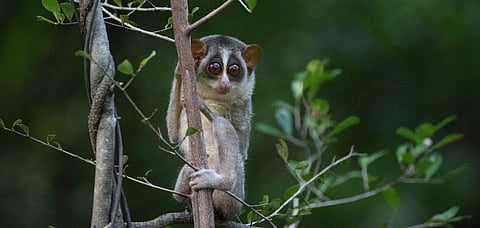

Dugongs gracefully navigate the ocean's depths, grazing on underwater grass or peacefully drifting through solitary journeys. These majestic creatures, akin to manatees, share a kinship with elephants in appearance and behaviour. However, their endangered status is a sobering reminder of the challenges they face in their natural habitats. Dugongs are found in Palk Bay, the Gulf of Mannar, the Gulf of Kutch and the Andaman and Nicobar Islands. The changing marine environment and ecological factors have reduced their population to merely 200.
In stark contrast to the aquatic world of the Dugongs, the slender lorises emerge as enchanting beings of a different kind. Opposite in appearance, these slight, doll-sized primates resemble the distant cousin of the lemur. Seekers of sanctuary in Acacia trees and hedgerow plantations that skirt the edges of farmlands in Southern India and Sri Lanka, these elusive creatures skillfully conceal themselves within thorny thickets, foraging for insects that form their primary sustenance.
Unlike monkeys, the slender loris does not jump from branch to branch and relies on the connected canopy of large trees for their habitat. With large chunks of their habitat being lost due to developmental activities, these arboreal animals are included in Schedule I of the Wildlife (Protection) Act of India, 1972, which accords them with the highest level of legal protection.
Conservation Efforts
Various NGOs in Southern India are trying to protect the habitat of these endangered species. One is the SEEDS trust, which has been working in the villages of Dindigul and Trichy since 1999. With most killings of the slender loris stemming from superstitious beliefs, the organisation had taken it upon themselves to educate the tribals about the creature by setting up classes in as many as 40 villages surrounding the Ayyalur forests in Tamil Nadu.
The Tamil Nadu Forest Department has taken a commendable step towards wildlife conservation by declaring the nation's first Slender Loris Sanctuary and Dugong Conservation Reserve. The slender loris, a nocturnal and slow-moving primate found in the dry areas of the Dindigul district, has finally found a haven in an 11,806-hectare sanctuary that spans Karur and Dindigul districts. This new development is a happy addition to the state's efforts to protect and conserve wildlife. For the dugong conservation reserve, which will be India's first, the Tamil Nadu government has notified Palk Bay, which covers the coastal waters of Thanjavur and Pudukottai districts with an area of 448 square km.
The proposed conservation centres for these species, the slender loris and the dugong, will be established in two years in Ayyalur and Manora, respectively. The Divisional Forest Officers of the respective districts have already drawn up a stunning 3-D concept visualisation of the facilities, which will serve as a reference for the consultants to be selected for the project.
"It is a great move. With the conservation of these beautiful and unique species, even habitat protection will get a boost. Benefiting all other species," said IFS officer Parveen Kaswan.
Tragically, the dugong and the Slender Loris are teetering on the brink of extinction, victims of human ignorance and exploitation. The Slender Loris, coveted for its body parts, are believed to possess mystical properties, falling prey to black magic rituals seeking to harness hypnotic powers. Even more disheartening, these harmless creatures are hunted for their organs, with hearts, livers, kidneys, and limbs sought after for their perceived medicinal value in treating ailments such as leprosy, joint pain, and poor eyesight.
Slender Loris Conservation Centre
In addition to the state-of-the-art 'Slender Loris Conservation Centre', the surrounding area will feature a plethora of related physical infrastructure, each thoughtfully designed to inspire and educate visitors. Guests can soak in the breathtaking surroundings from the elevated walkway or the eco-tower while the Vana Poonga beckons nature lovers with its lush greenery. Those searching for adventure can head to the adventure park, while the little ones can enjoy the children's play zone. For those seeking to commemorate their visit, the nature photo station and eco shop/cafeteria are perfect spots to capture memories or indulge in a quick bite.
The succulent and xerophytic garden will add to the visual appeal and educate visitors on the region's unique flora. Those curious about the elusive primate can visit the Loris Lore Conservation Center or even the world primate arena, while Loris World promises an immersive experience for all ages. Additionally, visitors can enjoy the simple pleasure of trees and other natural wonders that dot the area, inviting one to pause and revel in the beauty of nature.
Getting there Madurai and Tiruchirapalli are the nearest airports. Dindigul Junction Railway Station is the nearest major railhead.
Dugong Conservation Centre
The Dugong Conservation Centre stands as the project's shining beacon, capturing the imagination and hearts of visitors with its stunning design plan, which the shape of the majestic dugong will inspire. The main building will boast state-of-the-art technology designed to promote the conservation of these gentle creatures while engaging visitors in immersive experiences.
As a nod to sustainability, the main building will be an eco-friendly green structure featuring Virtual Reality (VR)/Augmented Reality (AR) segments on dugongs and seagrass, transporting visitors to another world through 3-D laser projection/hologram facilities. The Centre will also house Dugongs, seagrass monitoring/tracking facilities, and a Dugong gene sequencing / Environmental DNA Research Facility, furthering research and advancing knowledge about these fascinating creatures.
For those interested in the rich marine life, the Centre will also feature a marine museum, complete with an amphitheatre to showcase educational films and presentations. The marine exploration centre will encourage visitors to explore the underwater world. At the same time, the fisherman's cove will offer a glimpse into the lives of local fishermen and their relationship with the ocean. The Dugong Conservation Centre promises to be an unforgettable experience, offering visitors an opportunity to connect with the natural world while learning about the importance of conservation.
Getting there The nearest airport to Thanjavur is the Civil Airport at Tiruchirappalli, approximately 48 km from the city centre.
